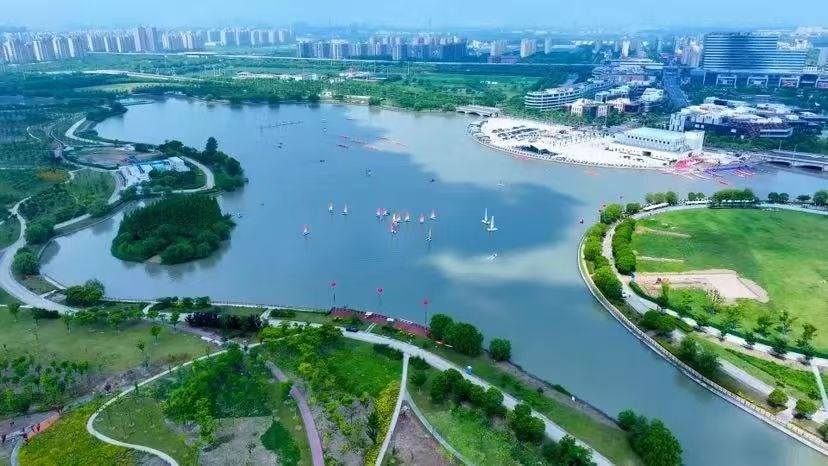
Waigaoqiao Group's Shanghai Sunland Waigaoqiao Commercial Operation Center Co Ltd and Shanghai Glenn Sports Co Ltd completed a transaction for a three-year operating rights agreement for water sports and ancillary facilities in the 4.7-hectare area of the Sunland Lake eco-clean small watershed.
The deal was concluded at a price of 1.05 million yuan (US$144,628).
Located in the northern part of the Pudong New Area, near the Waigaoqiao Free Trade Zone, the Sunland Lake eco-clean small watershed covers an area of 5.74 square kilometers.
Through years of green space development, water system management, and biodiversity protection measures, the water quality in the area has stabilized at Class III or above, with the ecosystem's gross ecosystem product (GEP) valued at 148 million yuan. This has transformed the region's carbon sequestration, water and soil conservation, climate regulation, and cultural services into tradable assets.
"In the second half of this year, we plan to introduce more sports activities to the outer lake of Sunland Lake. In addition to the current rowing events, we may add sailing, paddleboarding, canoeing, and more, hoping to support the maintenance of the ecological water area through increased sports activities," said Wang Haisong, general manager of Sunland Waigaoqiao Commercial Operation Center.
An officer from the Pudong New Area Water Authority said that they have pioneered the transformation from the "high aesthetic value" to the "high economic value" of water ecological environment. This successful transformation not only motivates enterprises to proactively fulfill their social responsibilities but also injects new momentum into the development of the region's green industries through an ecological feedback mechanism.
During the 14th Five-Year Plan (2021-2025), the district has focused on improving the water network system in Pudong, continuously advancing the construction of eco-clean small watersheds. To date, they have built 268 kilometers of slow traffic paths, 17 kilometers of ecological corridors, and 127 sections of star-rated rivers.
Compared to the traditional single-channel governance model, the governance of eco-clean small watersheds has shifted from improving the water environment to restoring the water ecosystem, providing an innovative paradigm for regional ecological management.
